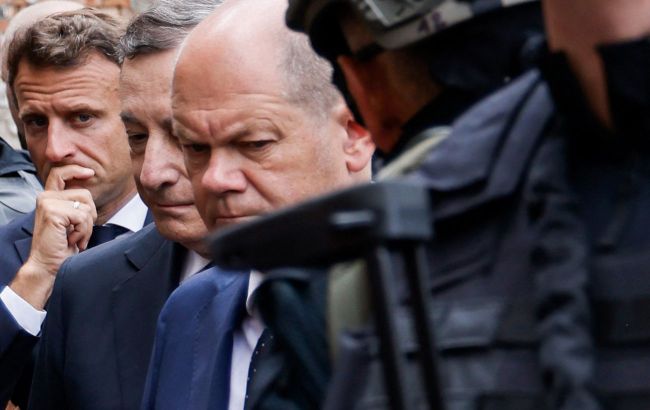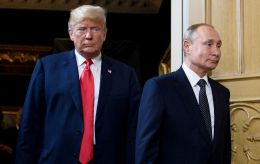France and Germany blocking €20 billion package for Ukraine - Spiegel
 Macron, Draghi and Scholz (photo: Getty Images)
Macron, Draghi and Scholz (photo: Getty Images)
Amid tensions between the United States and Ukraine, EU diplomats in the office of Vice-President of the European Commission Kaja Kallas have proposed a new large support package. However, France and Germany have expressed skepticism about it, Spiegel reports.
According to the media outlet, the initial figure of the aid package was $7 billion, but now it has reached $20 billion. The package should consist of three elements:
- about 1.5 million rounds of ammunition
- assistance to air defense systems;
- opportunities for the rehabilitation of Ukrainian soldiers and further training of Ukrainian brigades.
But there is resistance to this assistance. In particular, from Hungary and Slovakia. At the same time, diplomatic circles argue that the resistance of these countries plays a minor role. The package could have been passed by a coalition of the willing, even without the participation of the small states that oppose it.
However, according to Spiegel, in addition to the two usual EU outsiders, two key players have expressed skepticism in internal discussions: France and Germany. Both countries are heavily indebted and have little room for maneuver in their national budgets. In addition, both French President Emmanuel Macron and Italian Prime Minister Giorgia Meloni insist on Europe's leading role in negotiations with Washington. But the actions of Kallas and the EU cast doubt on this claim.
Meloni has already criticized the meeting in Paris called by Macron. Also, according to the Financial Times, Meloni opposes the G7 conference call on Monday. Apparently, she does not want to upset Trump. Macron, for his part, reassured the alienated small states at a special conference and now wants to go to Washington to talk to Trump.
Kallas's entourage is trying to smooth things over. Meanwhile, Germany will hold elections on Sunday, and the German government cannot make decisions over the weekend.
There are no fixed amounts of funding for member state ministries, which means that France and Italy also have room for maneuver. However, a decision may still be made on Monday, when foreign ministers meet in Brussels.
Spiegel also writes that politicians in Brussels are saying that leading EU figures have already promised Ukraine further support during the Munich Security Conference. Thus, when the US government offered Zelenskyy a non-disclosure agreement as a condition for further support, the Europeans spoke out against this agreement in the background. The agreement, among other things, included Ukraine's transfer of a significant portion of its mining rights to the United States.
Diplomatic circles in different countries have neither confirmed nor denied unequivocally that Ukraine has been promised more extensive support measures if it rejects the deal with US President Donald Trump. However, Foreign Minister Annalena Baerbock has already publicly stated on the sidelines of the Munich conference that "a large package of measures will soon be launched that has never been implemented on such a scale before."
Meanwhile, Brussels remains hopeful that Trump will not conclude negotiations with Russian dictator Vladimir Putin too quickly and that it will take a long time.
Decisions on other assistance to Ukraine
The other day, Olha Stefanyshyna, Vice Prime Minister for European and Euro-Atlantic Integration of Ukraine, said that no decisions on the initiative to mobilize more than 50 billion euros of military aid to Ukraine from the EU were expected before the German elections.

